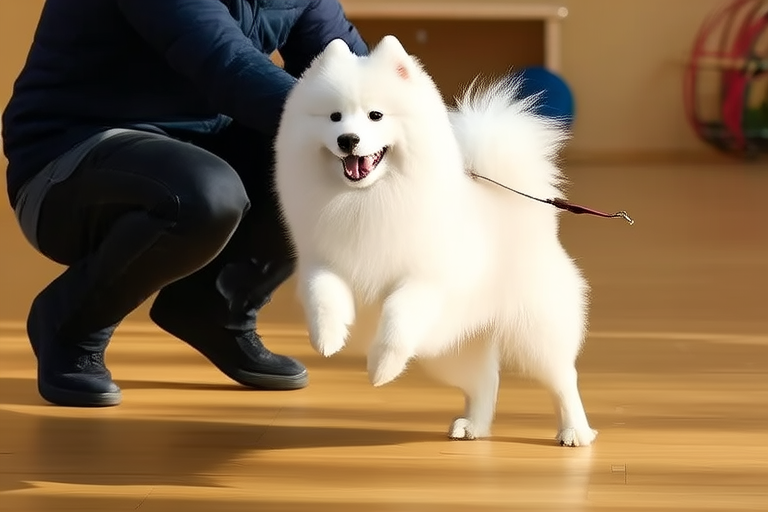Samoyed Training Tips: How to Handle Their Playful Nature
The Samoyed, a breed of dog originating from Siberia, is renowned for its friendly and energetic disposition. These dogs are known for their thick, fluffy coats and their striking white color, which makes them stand out in any crowd. Samoyeds were originally bred by the nomadic Samoyede people to herd reindeer and pull sleds. Their intelligence, loyalty, and affectionate nature have made them popular pets around the world. However, their playful and sometimes overactive tendencies can present challenges for new owners.
Understanding the Samoyed Breed
Samoyeds are a medium-sized dog breed, typically weighing between 45 to 65 pounds and standing about 19 to 23.5 inches tall at the shoulder. They are highly intelligent, which can make them quick learners but also means they require mental stimulation to stay happy and healthy. Their friendly nature means they usually get along well with other pets and children, making them excellent family companions. However, their playful and energetic demeanor can sometimes lead to behavior issues if not properly managed.
Common Challenges with Samoyed Dogs
One of the most common challenges that owners face with Samoyeds is excessive barking. These dogs are naturally vocal and may bark to alert their owners of potential threats or simply because they are excited. Another issue is chewing. Samoyeds have strong jaws and a tendency to chew on anything within reach, including furniture and shoes. If left unchecked, this habit can lead to damage around the house and potentially harm to the dog itself.
Owners may also struggle with leash pulling and difficulty in recalling their dogs when off-leash. Samoyeds have a high prey drive, which can make it challenging to keep them focused during walks. Additionally, their energetic nature means they need plenty of exercise and mental stimulation to avoid destructive behaviors.
Effective Training Techniques
To address these challenges, it’s essential to employ effective training techniques that emphasize positive reinforcement. Positive reinforcement involves rewarding your dog for good behavior rather than punishing bad behavior. This approach not only encourages desired actions but also strengthens the bond between you and your pet.
Consistency is key in training Samoyeds. Establishing a routine that includes regular walks, playtime, and training sessions helps keep your dog engaged and reduces the likelihood of behavioral issues. Use treats, praise, and affection as rewards when your Samoyed follows commands or behaves appropriately. Over time, your dog will associate good behavior with positive outcomes, reinforcing their learning.
Teaching basic commands such as ‘sit,’ ‘stay,’ ‘come,’ and ‘leave it’ is crucial for managing your Samoyed’s behavior. Start with simple commands and gradually increase the difficulty as your dog masters each one. For example, begin teaching ‘sit’ by holding a treat above your dog’s head and saying the command. As they look up, their bottom will naturally lower into a sitting position. Reward them immediately with the treat and verbal praise. Repeat this process several times daily until your dog consistently responds to the command without needing the treat.
Leash training is particularly important for Samoyeds due to their high prey drive and tendency to pull on the leash. Begin by introducing your dog to the leash in a calm environment where distractions are minimal. Allow them to explore while wearing the leash, then attach a short leash and practice walking side by side. Gradually increase the length of the leash and introduce more distractions. Use positive reinforcement to encourage calm walking and discourage pulling.
Appropriate Toys and Games
Providing appropriate toys and games is essential for channeling a Samoyed’s energy positively. Puzzle toys and interactive feeders can provide mental stimulation, keeping your dog engaged and entertained for extended periods. Balls, frisbees, and tug-of-war toys are great options for physical activity. Engaging in games like fetch or hide-and-seek can also help burn off excess energy and strengthen the bond between you and your pet.
Ensure that all toys are safe and suitable for your dog’s size and age. Avoid small items that could be swallowed or toys with parts that can easily break off. Rotate toys periodically to maintain your dog’s interest and prevent boredom.
Socialization Strategies
Socializing your Samoyed from an early age is crucial for their development into well-rounded and confident adults. Expose your puppy to various environments, people, and other animals to help them become comfortable in different situations. This exposure should continue throughout adulthood to ensure your dog remains sociable and adaptable.
Joining local dog clubs or attending obedience classes can provide opportunities for supervised interaction with other dogs. These activities also offer structured training sessions that can enhance your dog’s learning and reinforce good behavior.
Integrating your Samoyed into family life successfully requires patience and understanding. Samoyeds are generally very affectionate and enjoy being part of the family. However, they can be stubborn at times, so maintaining clear boundaries and consistent rules is important. Encourage gentle play with children and teach both your dog and your children how to interact safely and respectfully.
Creating a designated space for your Samoyed, such as a crate or a specific area in the home, can help establish a sense of security and ownership. This space should be comfortable and inviting, providing your dog with a retreat when needed.
Conclusion
Raising a Samoyed can be a rewarding experience, but it does come with unique challenges due to their playful and energetic nature. By understanding the breed’s characteristics and employing effective training techniques, you can manage these challenges and create a harmonious living environment for both you and your pet. Remember to provide ample exercise, mental stimulation, and positive reinforcement to ensure your Samoyed grows into a well-behaved and loving companion.
